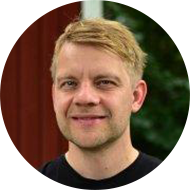
Where Medicine Meets Discovery
A Conversation with Marco Gerling
Marco Gerling is a group leader at Karolinska Institutet and an oncologist specializing in upper gastrointestinal cancer at Karolinska University Hospital Huddinge. As a translational researcher, he effectively bridges tumor biology and clinical applications. His work primarily investigates how tumors invade surrounding tissue and interact with non-malignant cells, insights that could inform future cancer therapies.
Written by Xijie Yang, PhD student at Karolinska Institutet and participant of the course “Career Skills for Scientists” during the spring term 2025

In my search to understand the diverse pathways available to medical professionals, I had the privilege of speaking with Marco Gerling, whose career journey reflects a thoughtful integration of clinical practice, scientific inquiry, and personal values. When I sat down with Marco Gerling, the conversation didn’t feel like a formal interview. It felt like a guided tour through the intersection of science, culture, and resilience, painting a portrait of what it means to carve out a life in medicine and research, far from where it all began.
From Germany to Sweden
Marco’s medical training began in Germany, followed by research experience in the United States, but it was Sweden that ultimately became his professional home. “Here, research can be more sustained. It’s not necessarily about the quick wins but about building something long-term. For me, that made it easier to explore ideas that might not be immediately publishable but are clinically relevant,” he says.
Sweden’s academic environment, he notes, is more flexible and less pressure-driven compared to other countries. This emphasis on balance between work, research, and family was a theme throughout our conversation.
A Scientist at Heart: Choosing Basic Research
Despite working as a clinician, Marco has deliberately chosen to focus his research on fundamental tumor biology.
“I find it stimulating to understand how tumors actually work,” he points out.
Clinical oncology, by contrast, often follows strict treatment protocols. “You meet a patient, and a significant part is to follow flowcharts — first line, second line, third line therapy. It’s essential, but not always intellectually creative.”
Even in industry-sponsored clinical trials, he found the constraints limiting. “These trials are key to advancing treatments, but at the core of it, you’re following a protocol. You’re not really getting to the bottom of tumor biology.”
This desire to uncover deeper mechanisms is what drives Marco’s research. He believes it’s critical to have people who can connect the dots, who can “translate” biological findings into meaningful clinical advances. And that’s exactly the space he occupies.
Bridging Two Worlds: The Translator’s Role
As someone who speaks both the language of science and that of clinical medicine, Marco sees himself as a “translator” — not in the linguistic sense, but in the intellectual one.
“We need people who can communicate equally well with both researchers and clinicians,” he explains. “It doesn’t happen every day, and it’s not easy.” His hands-on research experience gives him a unique vantage point: “Understanding the pitfalls and limits of experimental models, that’s not something you can just Google. It comes from doing the work.”
He finds it deeply rewarding to identify clinical problems, design research questions around them, and then bring findings back to patient care. “That back-and-forth process is where you can make a big difference.”
Balancing Acts and Trade-offs
Despite the advantages of working in Sweden, Marco is candid about the challenges. “My family would say that I don’t have great work-life balance,” he admits with a smile. “It’s a constant struggle.”
The flexibility of research allows him to be present for family moments, such as dropping off or picking up his kids from preschool, but the bill comes due later, often in the form of late-night writing. “It’s a choice,” he says. “You could opt for pure clinical work, but if you want both, it takes more than an 8-hour day.”
Sweden’s healthcare system rarely offers a limited number of fixed split-time roles between research and clinic.
“How much time I can spend on research depends on the funding I have now. Most often, I end up doing more clinical work than planned.” With rising patient volumes and expanding treatment options, the clinical load continues to grow without a matching increase in personnel.
A doctoral degree is often necessary to become a full consultant, and research experience adds valuable skills. Beyond that, career progression in Sweden is shaped by a combination of factors — clinical expertise, teamwork, and leadership among them. “There could be even stronger incentives for doing research, particularly translational research that requires large career investments in both dimensions”, Marco says.
Looking Ahead
Marco Gerling’s career is a blueprint for what it means to live at the intersection of discovery and care. He is not just a doctor or a scientist, he is a translator of insights, a connector of worlds, and a tireless advocate for research that matters.
His story is a reminder that career paths in medicine don’t have to be linear. With strategic choices, resilience, and a passion for knowledge, it is possible to shape a career that bridges science and service, and perhaps even makes space for a little balance along the way.

0 comments